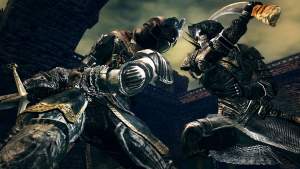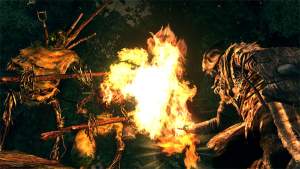Review by Peter Gothard
Dark Souls is the embodiment of hand-shaking, nerve-shredding risk. It’s that feeling of cold, sweaty dread you have when walking into a school exam you’ve not prepared for, or strapping yourself into the driving seat of a car you’ve never seen before, as a clipped and anally retentive test examiner prepares to tick all the boxes before you’ve even pulled away. More importantly, it’ll conjure up that one life left, final boss-facing injection of adrenalin you probably remember from a childhood of gaming that’s been almost erased in favour of checkpoints and regenerating health bars.
In a sea of increasingly unchallenging, humdrum experiences, Dark Souls is one of the sole inheritors of that feeling. Of being underequipped, under-practiced and underskilled, and knowing you haven’t a hope in hell. Perhaps you remember Namco’s vaguely alienating ad campaign – “Prepare to Die”? Issued, perhaps, as some kind of a challenge to so-called ‘hardcore’ gamers to come and try this thing out and to, well, not die?
Well, you’ll die all right. Over and over again. But that doesn’t mean you’ve lost, and it doesn’t mean you’re not ‘hardcore enough’. It means you’ve failed, perhaps, but only for now. Because what if you could throw yourself at those insurmountable odds over and over again? Learning the individual lay of the land, or inventing workarounds you’ll carry out so often they’ll become second nature to you? Parry that guy, stick the sword in when he’s stunned, backflip a fireball, chuck a magic projectile at that lizard thing over there to give you just enough time to… and that’s the next door, and the next checkpoint.

But the cycle repeats. Death after death leads to a waypoint in the darkness, but a new village, hellish cave or battlement introduces those with skills to match or, usually, better yours. While, like any RPG, there’s levelling, there comes a point where even this won’t help you; in the end it’s about committing those tricks and skills to muscle memory in order to develop a unique patter to help take on anything the world can throw at you.
In this way, Dark Souls was never about ‘success’ or ‘failure’ – it was about how quickly you were able to adjust to existing in a world that never stopped hating you. It can be completed in anything between one hour to around 70. And it’s perhaps the promise of tightening up your mastery of a flawless run through the world that keeps you coming back over, and over and over again.
That’s what life has been like for those of us who journeyed to Lordran late last year, and most of us still haven’t left yet. The mechanics, weapons and stat-centric character ‘builds’ have all been pretty much sussed by the community, but Dark Souls’ carefully arranged multiplayer offerings - which are less about Call of Duty-style killing fests and more about subtly affecting each other’s worlds via anonymous hints and fleeting co-op boss killing opportunities – still shine with an ironic vibrancy behind the cold, dead world you hoof around alone.

Unlocked in a hugely complicated way that pretty much requires a trip to Gamefaqs in itself, Artorius of the Abyss takes you back in time to face a clutch of new bosses, check out a few new environments, and even learn a little more about the game’s curious ‘humanity’ sprites.
Whether you’re facing leaping, snarling chimeras, garden fork-toting tree demons or the backflipping, supercharged form of Knight Artorias himself, the DLC is a carefully-constructed mini-world of interlaced levels connected by elevators, which unlock each time a crucial bonfire checkpoint is discovered.
Like the main game, it comes with more than its fair share of secrets, too. Weird-talking NPCs still sell you items, or simply chatter away, while one particular false wall delivers a rescue mission that can even change a part of the Dark Souls story when you return to the present.
The bosses require a surprising amount of investment; even with a character well over level 100, we required co-op assistance from online warriors for hire to crack the last boss. But a need for that transitive multiplayer - which in many ways a committed Dark Souls player never really needed before – offers an interesting new side to the challenge, as picking the correct sidekick based on name and looks alone can be the difference between experienced backup or “Urmom718” wafting a polearm around and being killed instantly.

Compared to Dark Souls’ existing subtleties of ‘invasions’, which are generally summons to another player’s world based on the intricacies of Lordran’s various cults and factions a player can join, such heavy-handed ordinariness grates, the game’s laggy and unpredictable player versus player fighting system remaining unchanged and providing ill-matched contests, unavoidable backstabs and other teeth-gnashing horrors.
It all feels as un-Dark Souls as everybody feared, and after a few weeks of testing it on and off, it's not a feeling we can say ever improves. It’s also largely difficult to get a game, as Dark Souls’ savvy and committed fanbase has turned its back, as it probably rightly should.
Still, for a mere 1200 (Xbox 360) or £9.99 (PS3) Artorias of the Abyss is essential content for anyone wanting to test the higher level potential of their trusty characters, learn more about Lordran’s vague and shattered history, or simply kill a bunch more excellently designed and downright terrifying monsters.
And with the sequel just announced at the VGA Awards, it’s more important than ever to crack Dark Souls and start to prepare to die – in a whole load of interesting new ways – whenever From Software completes its next full-length offering.